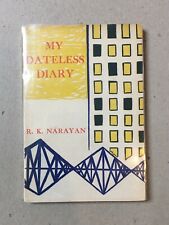 First edition | |
| Author | R. K. Narayan |
|---|---|
| Genre | Autobiographical essays |
| Publisher | Indian Thought Publications |
Publication date | 1960 |
| Publication place | India |
| Media type | |
| ISBN | 978-0-14-010941-2 |
| OCLC | 20132905 |
| 823 B 20 | |
| LC Class | PR9499.3.N3 Z472 1988 |
| Preceded by | The Guide |
| Followed by | The Man-Eater of Malgudi |
My Dateless Diary is a collection of autobiographical essays by R. K. Narayan published in 1960. [1] The book was the output of a daily journal that he maintained during his visit to the United States on a Rockefeller Fellowship in 1956. [2] While on this visit, Narayan also completed The Guide , the writing of which is covered in this book. [3] The book is focused on Narayan's interactions with the American people and the people themselves. [4] The book also highlights Narayan's view of the west, his appreciation and admiration in general, but subtle disapproval of specific aspects while making it known that there isn't much of a gap between his values and those he has come across. [5] The book offers insights into both, the author and his subjects. [6]